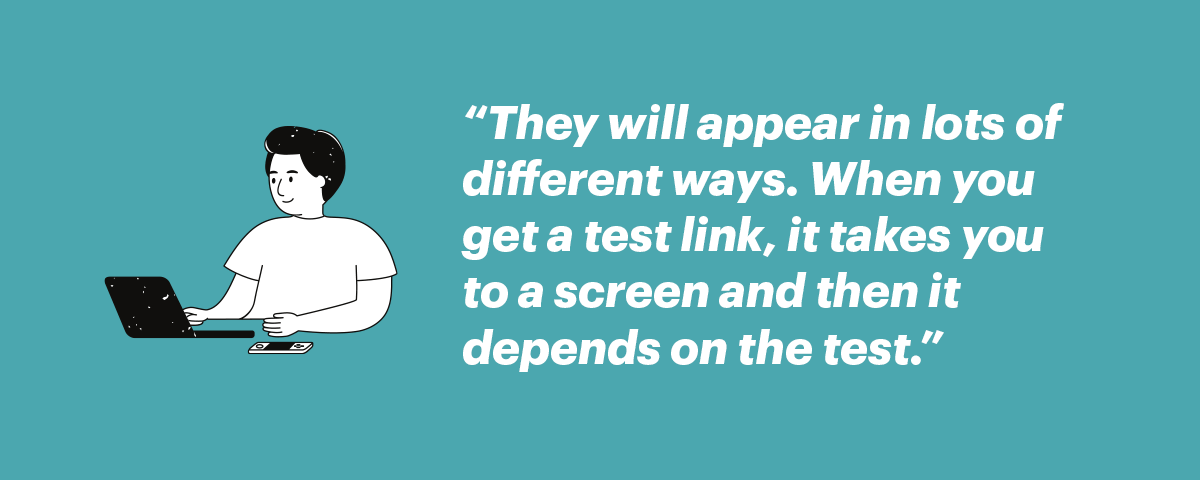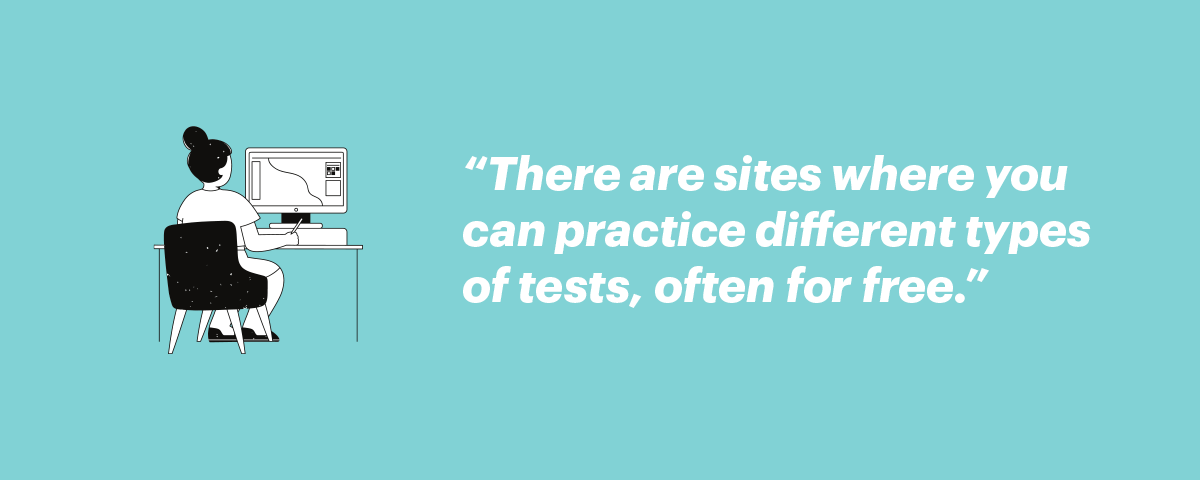Imagine you could get solid job search advice directly from someone with experience in recruiting and HR. Wouldn't that be helpful? Now you can do just that thanks to our new interview series Recruiter Reveals! Every month I interview our resident HR expert Christy Morgan on various job search topics — be it resumes, cover letters, job interviews, or anything marginally career related. |
If you thought your test-taking days ended when you graduated, think again.
Already more than 75 percent of large companies use assessment tools such as aptitude and personality tests to screen applicants.
And due to the pandemic and remote hiring, this trend is likely to become even more widespread.
As bothersome as it sounds, don't worry! Christy, our in-house HR expert who used to be involved in candidate assessment centres, will tell you what exactly you can expect and how to prepare.
Oh, and don't forget to try an online test that's linked at the end of this interview!
In this interview, you'll find out:
- What are pre-employment tests;
- Why employers use them;
- About their pros and cons;
- What different types of tests are there and what do they measure;
- What to expect from them;
- How to prepare for these tests;
- Whether failing such test automatically disqualifies you;
- Whether job tests will become even more widespread in the future.
You have experience with pre-employment tests from the HR side. Could you tell me a bit more about your background?
I used to work at Hudson, a global recruitment and talent management consultancy. Hudson specializes in designing and running assessment and development centres for client organizations. Assessment centers are generally 1-2 day events where shortlisted candidates are evaluated through a variety of exercises to determine their fit with the client organization and the job. I mostly administered these, but I once had the opportunity to be a lead assessor for a big project in Moscow to screen about a hundred graduate applicants. That was lots of fun!
And a development center is when companies have employees that they want to promote or develop. A lot of the exercises here might be similar, but they have slightly different purposes.
Assessment and development centers are the more traditional approach. These days, a lot of companies like to use quicker online assessments instead. For example, I've recently been doing some content work for a Slovak startup that offers a virtual hiring platform, which includes psychodiagnostics and skills tests.
What exactly was your job as a lead assessor at the assessment centre at Hudson?
I coordinated and mentored several junior assessors, some of whom were doing this for the first time in English. I coached them to ensure they were being as objective as possible when evaluating candidates, particularly in any exercise involving observation. Apart from this, I also built a rapport with the candidates, put them at ease, and helped to make sure that everything ran smoothly.
In a nutshell, what is pre-employment testing?
In a nutshell, it could be anything from traditional assessment centres through to quick online skills tests. Regardless of method, what they're all looking for are specific attributes or skills that are generally required for that specific role and organization.
Why do employers use it?
The idea is to optimize the screening process to make talent selection more accurate, quicker and, in theory, more objective. For example, if a company's hiring graduates and they're trying to filter fifty good applicants down to a shortlist of two or three. This is a way that you can do it. You know what attributes you need and these pre-employment tests can in theory identify the most likely fits.
I say “in theory” a lot because when it comes to online assessments in particular, the outcome depends on the quality of the test, the accuracy, the interpretation, and the science behind it.
You've already mentioned an advantage for job seekers — a potentially less biased hiring process. Are there any other advantages?
That's a really good question, because the candidate experience is something that’s often lacking here. Apart from an in-theory fairer hiring process, it could also help them clarify whether it's really the type of role they'd like to do. But I have to say this idea of pre-employment testing isn't not always designed with the candidate experience in mind.
That's the thing. I feel like employers would benefit more than job seekers in this case.
Absolutely. I work these days on the candidate support side, so I feel more passionate about their experience. I’ve heard lots of stories where companies send out a skills test or an online assessment to candidates, but the instructions aren’t clear or they don't clearly explain why the assessment is important. There’s also this expectation that it must be completed to proceed further in the hiring process. So the candidate has no choice: complete it or be rejected.
Secondly, the quality and relevance of these pre-employment tests can also be questionable. It can really vary depending on who the provider is, how much the company has invested in quality testing, whether they have used a customized or off-the-shelf solution, who customized those questions, whether it's scientifically-based, and so on. For instance, at Hudson, assessments are designed by organizational psychologists and are scientifically-based. The emphasis is on science, objectivity, and years of research and development.
There are lots of companies these days offering online tests for organizations. These usually enable the recruiter to choose questions from their database, which can be narrowed down to job-, personality-, culture-, hard skill-, or soft skill-specific questions. Which is really great in theory. My main concern with these are when recruiters don’t think deeply about the types of questions they’re asking, why they’re asking, or how the responses are interpreted by the software or even by themselves. Sometimes they’ll select questions because they look cool or sound challenging, even if they aren’t really relevant to the role. Recruiter training on the tool may be minimal, or the science behind the tests may be questionable. These are big cons.

Can you think of any other cons?
Candidates might feel the urge to answer questions in a different way, for instance they pick what they think the assessment is looking for rather than answering honestly. So they try to manipulate the results to impress the hiring manager. What they don’t realize is that many of these tests can pick up inconsistencies. That’s why you may see the same type of question or challenge pitched in a slightly different way later in the test.
Exactly! I've tried one of these online tests and multiple questions came up repeatedly, just with a different wording.
Yes, and if you have no clue why, you're like “Didn't I just answer that?”. But they're trying to catch inconsistencies with this. Because you may try to guess the desired answer at the beginning, but if you answer the same question three or four times, eventually you may slip up and say what you really think. And if it's inconsistent, you can get rejected. So, you shouldn't be figuring out ways to work around these things.
It's meant to be a way to optimize the hiring process, but it can be a little bit of a minefield. Let's say you're having a bad day, for instance. Last night, I slept three hours and I'm tired. I would not excel at a test today that I might ace tomorrow. Even the fact that we say “test” when they're often an “assessment” — that one word “test” can make some people freak out and perform poorly.
True. If I was to apply for a job and they'd send me a test, I'd probably be a bit stressed out about it.
Yes, and that's not good either. On the one hand, they want to objectively measure how you react in certain situations. For example, assessment exercises where you have an email inbox and you have to prioritize messages. That can be great. And in real life, you can probably do that very easily.
But when you're under pressure, especially when you're doing a timed assessment and the clock is tick tick ticking, that's super stressful and not natural. That can definitely affect your performance.
These are the main cons of pre-employment tests, particularly the quicker online ones. I think companies should use them as an additional tool as part of the hiring process. But some companies use them to filter candidates before even doing a telephone screening or interview.
Another thing is that it can be discriminatory in a way that it can victimize people with disabilities.
If you go to an in-person assessment centre, you can tell the coordinator in advance and they'll make adjustments. Some of the better online tests also have features to meet some of these needs. But many don’t take these into consideration. So you're right, it can bar people with disabilities. They might receive a test link from a generic email address and they’re not even sure how to contact the recruiter directly and explain their disability — or they don’t want to because they’re afraid of discrimination.
Tests are becoming more popular when hiring remotely. Why is that? Is it to make the process quicker or because recruiters can’t observe as many things as when hiring in person?
Particularly during the pandemic, as you would have seen, virtual interviewing has become a big thing. And many companies discovered that it can make hiring faster. The same with these pre-employment tests. They’re fast, and they’re easy to send out — just a few clicks of the button. In theory, they can help recruiters decide if someone is a good fit much more quickly.
I feel like these tests can be useful when you've already selected a number of candidates and interviewed them. Then you can use tests as a form of additional evaluation. What do you think?
Yes, I absolutely agree. I think they should be part of the process in combination with other evaluating factors. Not to filter them out before even talking to them.
What different types of pre-employment tests are there?
Oh, there are lots of them. And this is the problem, but also the good thing. :D You've got soft skills, hard skills, personality tests, or verbal reasoning which is about your ability to interpret text. There are numerical tests where you have to interpret numbers and data. Also situational tests — how you behave in certain situations. Then there's technical, for instance for software developers. Some companies also use game-based tests to assess logical reasoning and decision-making. Assessments can be timed or untimed. But at the end of the day, the type of test really depends on the role and what they're looking for. Or at least it should.
What are companies trying to measure with these tests?
The general idea is to find the best fit for that role in terms of competencies, experience, and culture fit. You can usually find the clues in the job ad — whether it's for tailoring your resume or for tests. Just have a look at who they're looking for. Are they looking for someone who's an independent thinker? Are they looking for somebody who is a good decision-maker? Or are they looking for somebody who's great at Excel? Whatever it is, they'll usually mention it directly in the job ad. And the pre-employment tests should, in theory, be based on these. Plus, they can also determine likely culture fit, based on personality tests or your responses to certain questions.

Do you think that some companies only do these tests just because it's kind of fashionable nowadays?
Yes, there are definitely companies like that. Many companies want to be seen ahead of the game and all the rest of it. And that comes down to another thing. You may have a well-designed assessment but it also comes down to interpretation. The person who's reading the assessment results also needs to understand the language and should be trained to interpret these correctly. Because just because the results seem to be saying one thing, maybe that's not what it's really saying. And that's really another crucial aspect that these people who are interpreting it and using it in the hiring process should really understand the science behind it and what they're actually looking at.
Are online pre-employment tests suitable for specific positions, or practically for any position?
They say it's practically for any position. But given all the cons versus pros currently, I think they’re much better suited for technical assessments or specific job-related skills that are fairly objective to assess.
Let's say I was to pursue a job as a content writer. What kind of tests could I expect?
One that comes to mind is verbal reasoning. This might involve reading random passages of text to assess your comprehension skills. Because as a content writer, you have to do some research, analyze information sources, and outline your findings. So, I'd check your ability to assess texts and your logical conclusions, for example if you can determine whether certain statements are true or false. Or if you can pick out key information — what's important and what's not.
Can job seekers also ask a recruiter what type of test they'll use?
Not always. Especially for online tests, sometimes you’ll just get a test link, perhaps with a brief explanation of purpose, and that's it. Or you may not even know who the recruiter is if it comes from a central email address. But if you know, there's no harm in asking them.
How to prepare for the pre-employment tests?
There are sites where you can practice different types of tests, often for free. If the company has asked you to do a numerical test, for example, you can find some practice ones online. Even if you don't know which one you’ll get, there’s no harm in familiarizing yourself with different types of tests and training your brain. There are plenty of resources out there.
And sometimes, the actual test will allow you to practice first. But you may not necessarily know that until you actually click the link.
How do these pre-employment tests work? What can job seekers expect?
They will appear in lots of different ways. When you get a test link, it takes you to a screen and then it depends on the test. For example, you might have a verbal reasoning exercise where you have to read some text and decide whether certain statements are true or false. That tests your ability to interpret information. Or it could be a situational test where you've got a bunch of emails and you have to prioritize which to read, respond to, and make decisions about.
It also can be a puzzle where you have to move elements around, or a game. And then there's technical tests, which are probably more straightforward in that they’re checking your technical expertise. It could be multiple choice or you have to type in the answer. It varies.
Are you being recorded as you're taking the test?
Not usually, unless you're doing it during a virtual interview, which does happen sometimes. Then they can observe you in real time and possibly record the session.

What happens next? Recruiters check the answers or a system will provide them with a description of a job seeker?
Depends on the company and the solution. Usually, the recruiter receives a customised report about the job seeker that highlights strengths, weaknesses, or development areas. Some will compare these findings to the job competency profile and rate how closely the person matches it. Sometimes, the job seeker gets a copy as well — and I think that's a good thing.
And a recruiter will then let job seekers know whether they “passed” or “failed”?
Yes, they should contact them directly. However, you do hear of companies that send out an automated rejection message that just says something like “Based on the results of the test, you unfortunately don't qualify for our position.” No direct communication from the human recruiter.
In case you “fail” the test, can you retake it?
Most of the time, no.
When the test is done after an interview, what matters the most? A resume, job interview, or test results?
Ideally, it should be a combination.
So, let's say a candidate has a very good resume, makes a great impression at a job interview, but “fails” the test. Does it automatically disqualify him?
Not necessarily. I understand it could have been just a bad day for them, or they were nervous. So, it shouldn't be the only deciding factor, but as a part of the toolkit in the hiring process. What I'd do in that case is I'd take a look at other ways to assess them. Maybe I'd do situational tests, coding exercises, or whatever it is to assess a good candidate from a different angle. Or let them retry the assessment. Because obviously there's a disconnect between what they say they can do and how they perform. And then if it's consistently not looking good, then maybe I’d go back and review their interview responses or resume.
Can you then elaborate and ask for an explanation?
You can. Unfortunately, a lot of companies these days are nervous about being accused of discrimination, so they may not give you any further feedback. I think it's fair to at least give you a copy of your results.
And what if you want to apply for a job at the same company after a while? Do they still use the same results or you take the test again?
Usually, they'll say that results are valid for twelve months, or six months, or whatever. They may say that in the email that you get when you are rejected. Companies shouldn't use two-year-old results, for example, because they’re not relevant anymore. And if they do, it would be a red flag for me. But usually, they say how long the results will be valid.
And how does it work in the big assessment centres that you've mentioned?
There are some bigger companies that prefer these. These are usually one or two-day in-person events involving multiple customized exercises. Candidates are assessed more deeply, objectively, and holistically. Exercises could be a combination of simulations, role plays, psychometric tests, in-tray exercises, observations, or in-depth interviews. Then assessors create a detailed report for each person and compare it to the competency profile. And at these centers, candidates usually get detailed feedback as well.
If job seekers want to get a new job nowadays, is it very likely they'll have to do some kind of test?
I'd say it's certainly possible. We’re not yet at the stage where it's highly likely, but I see more and more companies using these, particularly in the US. And Europe as well. Also, more startups are developing such online tools because they see the big bucks in it due to the pandemic and the subsequent increase in remote employees and virtual recruitment.
I can imagine there'll be some job seekers who will get intimidated by the test-taking. What would you advise them to do?
Yes, and there are people who flat-out refuse to do them. And I totally understand why. Unfortunately, at the end of the day, if you don’t do it, you won’t be considered. But I think resistance is often a matter of how companies explain it to job seekers. They should explain what the assessment is, why they're doing it, what's the benefit for the candidate, what will happen next, just explain it clearly and enable them to ask questions. Or direct them to practice resources or videos explaining the process. And then, I think, you'll have a little less resistance.
Key takeaways: Pre-employment tests
- There are different types of tests: Soft skills, hard skills, numerical, verbal reasoning, technical, personality tests, situational tests, game-based tests, and timed or untimed. The type of test really depends on the role and what they’re looking for.
- Try to find out what type of test you'll have to take: If you have recruiter's contact information, try to reach out to them and ask what type of test you'll take.
- Prepare: There are sites where you can practice different types of tests, often for free. Try to test yourself here and check out what to expect in each type of test.
- Don't stress out: Many companies use pre-employment tests only as an addition to the traditional hiring process. So, even if you "fail" one, it doesn't automatically disqualify you.



